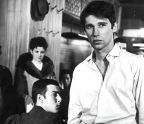
“Listen, darling, you’re imagining too much.”
—Oyoshi (Sugimura Haruko) in Floating Weeds (1959)
My second opportunity to experience the work of French filmmaker Jean-Claude Rousseau—whose patient, curious, and altogether cleansing sensibility is as radiant, pure, and necessary as that of any active filmmaker I can think of—came at the 2017 Locarno Festival, where he unveiled two new medium-length pieces, Arrière-saison and Si loin, si proche. This pairing, the first of what now amounts to three completed works that he shot in Japan, marked the most significant evolution in his otherwise remarkably consistent aesthetic tendencies. Namely, they were shot in HD video, and therefore in the comparatively wide 16:9 frame—an ironic gesture given that these films saw Rousseau explicitly announcing his debt to Ozu, who so famously pooh-poohed CinemaScope by likening it to a piece of toilet paper.
I bring up and quantify this encounter for a couple of reasons, the first of which is to underline an increasingly inexplicable fact regarding Rousseau’s exposure in North America—that it is largely nonexistent. There are myriad excuses that might be made for this, chief among them being that his project is heavily weighted toward the kind of medium-specific formalism that often gets dismissed as art for its own sake. Further, while one can find in his work significant commonalities with some of North America’s premier experimental film practitioners from the latter half of the 20th century—Benning’s exploration of the reel and its structural principles, Snow’s preoccupation with framing, Beavers’ metaphorical and metatextual alignment with the camera’s parts and operations, Dorsky’s faith in a poetic, mysterious, extralinguistic cinema—this is a line of inquiry that has dipped under the radar on these shores for more than a decade now. Lately, perhaps necessarily, this medium is for messages, and as Rousseau makes perfectly clear whenever he speaks about art and/or his practice, he is interested in anything but.
The other reason I evoke Rousseau’s Japan films is because his latest work, the nearly hour-long , was likewise shot there, and is easily among the most rapturous and accessible expressions of his aesthetic concerns yet. Shot in Nara (the other two take place in Kyoto), the film offers a stream of scenes that Rousseau captured in the prefecture’s parks, sidewalks, bars, and subway cars, not to mention the pseudo-domestic, purgatorial nowhere/anywhere that is his hotel room, a common motif throughout his filmography. Although he takes great care to describe his creative process as being opposed to the strictures of mental images, his arrangement of scenes here affords the images a feeling not at all unlike an impressionistic production of memory; to echo some words by the Spanish poet José Ángel Valente that have been of some importance to Rousseau, “perhaps the only thing the artist creates is the space for creation.” While Rousseau’s frames are as attentive as ever to the banal beauties offered by his locations, his camera inhaled an exceptional degree of vibrancy and serenity this time, traits embodied, especially,






